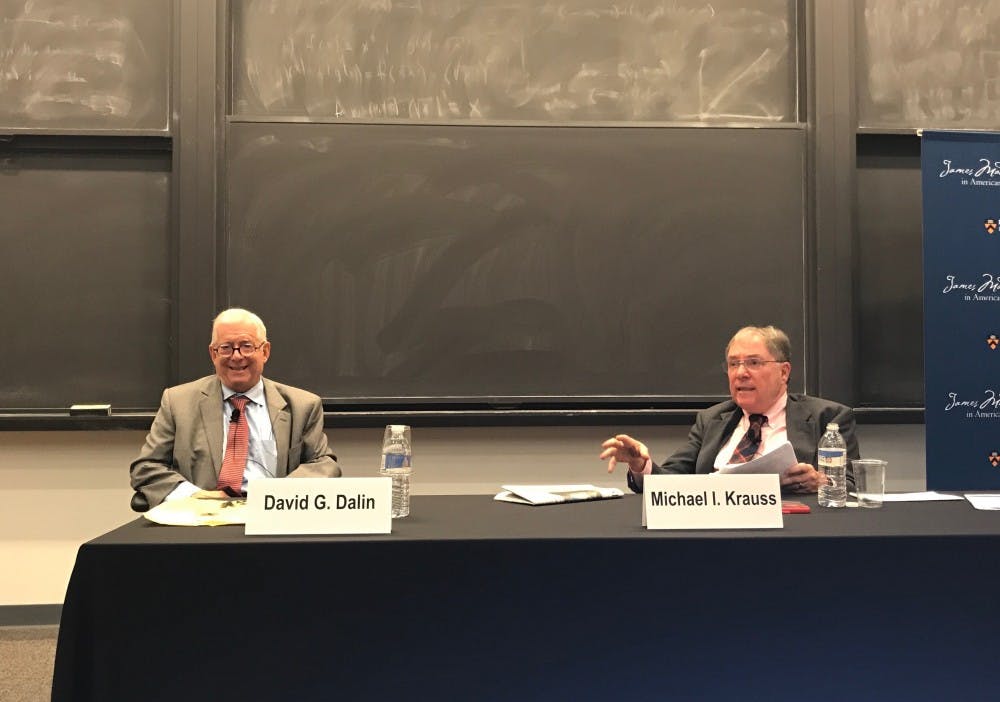On Monday, Oct. 15, Rabbi David G. Dalin joined George Mason University Professor of Law Michael I. Krauss for a discussion on the history and legacy of Jewish Supreme Court justices.
The talk, moderated by McCormick Professor of Jurisprudence Robert P. George, covered the lives and legacies of these justices in connection with their faith and traditions. Currently, one third of the justices on the Supreme Court are Jewish, but that has not always been the case.
“There was informally, but truly, a Jewish seat on the Supreme Court of the United States, just as there was a Catholic seat and a Southern seat,” said George. “It’s interesting, what a change that is.”
The lecture began with a discussion of Judah Benjamin, a great orator in the Senate and the first Jewish nominee to the Supreme Court. Though Millard Fillmore offered him the nomination, he declined. During the Civil War, Benjamin became the first Jewish secretary of state for the “not quite Kosher” Confederate government, according to Krauss.
Justice Louis Brandeis, the first Jew to be confirmed to the Supreme Court, arguably had limited ties to the Jewish religion and culture. Instead, Brandeis’s Jewish heritage appealed to President Theodore Roosevelt, as he was looking to oppose the British division of Palestine. Although his lobbying would be considered the “height of impropriety” by today’s jurisprudential standards, Brandeis did leave a legacy of Zionist advocacy on the Court, and was “single handedly responsible for persuading Woodrow Wilson to support the Balfour Declaration,” according to Dalin.
The Jewish seat became further established with the appointment of Benjamin Cardozo, the only Jewish justice to be appointed by a Republican president, Herbert Hoover.
Over the course of his tenure on the court, Cardozo faced anti-Semitism not only from the public, but also from his fellow justices, one of whom refused to take an official photo with Cardozo on account of his religion.
The “scrupulously honest” Justice Cardozo “was a progressive in terms of policy, but in terms of jurisprudence, he was always someone who believed in the restraining rule of the court,” said Krauss. To this day, Cardozo’s writings on tort law are still cited in Supreme Court decisions.
The third Jewish justice, Felix Frankfurter’s legacy is tainted by his “virtual silence during World War II,” according to Dalin’s book. Upon receiving proof of the Final Solution, Frankfurter ignored it and never urged Franklin Roosevelt to attack Auschwitz.
The next Jewish Supreme Court justice, Justice Arthur Goldberg, had his time on the bench cut short when President Lyndon Johnson asked him to resign in order to make room for for his close friend and political ally Abe Fortas. After Fortas was eventually caught up in a financial scandal, he resigned in disgrace. It then took 24 more years before there was another Jewish justice.
According to Dalin, the self more recently described “allergic to discrimination” Justice Ruth Bader Ginsburg developed the field of gender law and became the first female law professor to gain tenure at Columbia University. In 2003, when the first day of the court’s session was scheduled to fall on Yom Kippur, she and fellow Jewish justice, Justice Stephen Breyer, successfully lobbied to change the date.
The most recent Jewish justice, Justice Elena Kagan ’81, advocated for herself in the face of discrimination early in her life. According to Dalin, girls in the Orthodox tradition typically did not have bat mitzvahs. However, Kagan persevered and had the first bat mitzvah in her synagogue.

“They did not allow her to have her bat mitzvah on Saturday morning, she had to do it on a Friday night. She could only read from the prophets, she could not read from the Torah,” Krauss said. “This was a young girl who insisted on equal rights.”
Students and community members alike enjoyed the lecture. “I thought it was terrific,” said Sarel Anbar ’20. “It was funny and informative. I learned a lot about the history of the Jewish Justices.”
The lecture took place at 4:30 p.m. in the Lewis Library.








